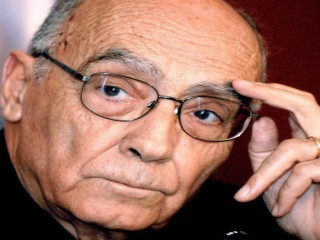
Jose Saramago biography
Date of birth : 1922-11-16
Date of death : 2010-06-18
Birthplace : Azinhaga, Portugal
Nationality : Portuguese
Category : Famous Figures
Last modified : 2011-09-23
Credited as : novelist, playwright and journalist, Nobel Prize for Literature
0 votes so far
José Saramago was a child of Portuguese peasants, raised in poverty in France, who learned of literature through visits to the public library as often as his parents would allow. His first novel, published in 1947, was not a popular success, and after finishing a second novel, never published, he concluded that he simply had nothing to say and gave up on writing. He supported his family with manual labor, eventually finding positions as an office manager for a publisher, a newspaper editor, a translator of foreign authors' work, and a political commentator. Nearly two decades passed before another book with his byline appeared, a small collection of his poems published to no acclaim in 1966.
He was a life-long Communist, and at serious risk to his safety Saramago became an outspoken leader of the 1974 Carnation Revolution (named for the flowers carried by protesters in lieu of violent action), which toppled the Portuguese dictatorship and installed a democratic government. His breakthrough success came with the blasphemous Baltasar and Blimunda, a 1982 novel about an 18th century romance between an injured soldier and a young clairvoyant. A widely acknowledged masterpiece was his 1984 novel The Year of the Death of Ricardo Reis, which resurrected the titular character from Fernando Pessoa's fiction and set him amidst the Spanish Civil War and the rise of such tyrants as Adolf Hitler, Benito Mussolini, Francisco Franco, and António de Oliveira Salazar. Arguably his best known work, 1991's The Gospel According to Jesus Christ, tells the familiar New Testament story with the twist that Christ was the son of Joseph, not God.
His works were frequently considered controversial, with good reason. He took delight in treading on delicate sensibilities far beyond Portugal's politics, with subversive but often humorous observations on the Vatican, globalization, ecological destruction, social injustice, the heartlessness of bureaucracy, and the cruelty of human greed. He was awarded the Nobel Prize for Literature in 1998, after which his readership was vastly increased.
Of his Nobel win, The New York Times pronounced that "No candidate for a Nobel Prize has a better claim to lasting recognition than this novelist", while the Wall Street Journal complained about his "Stalinist past" and the Vatican's official newspaper described him, accurately, as an "inveterate communist with anti-religious views". His Nobel accolade included a cash award of about $950K, of which Saramago said, "This prize is for all speakers of Portuguese, but while we're on the subject, I shall keep the money". He died in 2010.
Saramago was awarded the Nobel Prize for Literature in 1998. The announcement came when he was about to fly to Germany ahead of the Frankfurt Book Fair, and caught both him and his editor by surprise. The Nobel committee praised his "parables sustained by imagination, compassion and irony", and his "modern scepticism" about official truths.
















